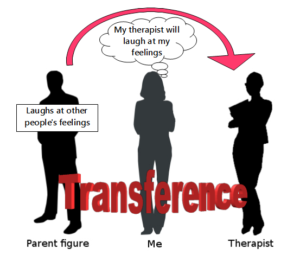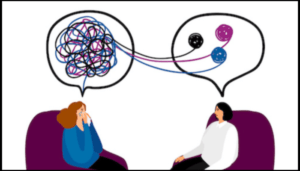Transference psychology is the practice of understanding unconscious feelings through the lens of past relationships or experiences. This process can be applied to anything from your pet to a stranger on the street, but it has been most commonly used in psychotherapy sessions with patients where there are unresolved emotions stemming from old relationships.
Contents
- 1 What Is Transference Psychology?
- 2 What Is Transference?
- 3 How Does Transference Work?
- 4 Benefits Of Transference Psychology
- 5 Different Types Of Transference
- 6 Where Does Transference Come From?
- 7 Transference In psychotherapy sessions
- 8 Does Transference Happen Out Of Therapy?
- 9 Factors Causing Transference In Therapy
- 10 How Does Transference Affect Therapeutic Relationship?
- 11 Conclusion
What Is Transference Psychology?
 Transference psychology is a process used to understand unconscious feelings by applying them to past relationships, experiences, or even those outside of the self. In psychotherapy sessions, transference between patient and therapist can be used as a tool to better understand underlying emotions from unresolved relationships. Beyond the walls of a psychotherapy office, transference has been used in many other situations, through the lens of past experiences. The concept of transference has been used to better understand our pets, or even to help us relate to strangers who might be in need of assistance.
Transference psychology is a process used to understand unconscious feelings by applying them to past relationships, experiences, or even those outside of the self. In psychotherapy sessions, transference between patient and therapist can be used as a tool to better understand underlying emotions from unresolved relationships. Beyond the walls of a psychotherapy office, transference has been used in many other situations, through the lens of past experiences. The concept of transference has been used to better understand our pets, or even to help us relate to strangers who might be in need of assistance.
While it is a process that is typically used by therapists and psychologists during therapeutic sessions, there are some examples outside of these practices. A relationship between two people can be transference, as two individuals may see each other in the same way they once saw an ex. Pets are another way to look at transference; if you had a pet that wasn’t treated well by your parents when you were younger, then you may express anger or sadness toward your new furry friend even if they have done nothing wrong. Lastly, transference can also be used when we see people on the street who need help. If you have had a traumatic experience with someone in a similar situation, you may be less likely to help them or even be scared of them.
What Is Transference?
Transference occurs when a person starts to transfer emotions or feelings that were originally connected to an earlier person (such as their parents) onto someone else. Transference often occurs during psychotherapy, but can also happen outside of therapy.
In psychotherapy, transference often occurs because the therapist is seen as a blank slate. This means that the person being treated doesn’t know enough about the therapist to form an opinion. The lack of opinions makes it easier for people to transfer emotions they originally associated with other people onto their therapist.
For example, if a patient’s father was overly protective, the patient might transfer that feeling onto their therapist because they perceive them to be overly protective.
How Does Transference Work?

It is important to understand that transference is not limited to relationships with other people, but can also be applied to experiences or events. In the psychotherapy setting, transference is often used as a way to understand unresolved emotions in patients. These emotions may stem from relationships with parents, siblings, friends, or romantic partners. The therapist will work to help the patient explore these feelings and understand why they are manifesting in the current relationship.
When transference is used outside of a therapist’s office, it can be helpful in understanding our relationships with others or with experiences we’ve had in the past. For example, if you have had a traumatic experience with someone in a similar situation as the person you see on the street who needs help, you may be less likely to help them or even be scared of them. Transference can also be helpful in understanding our relationships with pets. If you had a pet that wasn’t treated well by your parents when you were younger, then you may express anger or sadness toward your new furry friend even if they have done nothing wrong.
Benefits Of Transference Psychology

There are many benefits to transference psychology therapy. One of the main benefits is that-
- It can help us understand ourselves and our relationships better. This can be helpful in improving our relationships with others.
- Transference psychology therapy can also help us resolve unresolved emotions from our past. This can be helpful in improving our mental health and wellbeing.
- Transference psychology therapy can be helpful in increasing our self-awareness. This
- can be beneficial in helping us to make positive changes in our lives.
- Lastly, transference psychology therapy can help us to build better relationships with others. This can be helpful in improving our overall well-being.
If you are considering transference psychology therapy, please speak to your therapist or doctor to see if it is the right treatment for you.
Different Types Of Transference
There are different types of transference therapy that can be helpful in understanding our relationships. These include-
- Erotic transference-Erotic transference is when a patient feels sexual attraction toward people.
- Negative transference-Negative transference involves feelings of anger or hate.
- Narcissistic transference- while narcissistic transference involves seeing the therapist as an extension of yourself.
Each of these types of transference can be explored in psychotherapy sessions to help us understand why they are manifesting in our current relationships.
There are many different forms of transference, but some common examples include:
- The idealization or devaluation of particular people
- Projecting negative feelings onto others
- Recreating old relationships in the present
- Having inappropriate sexual feelings for certain people
There are many challenges that transgender people face on a daily basis. These challenges can include discrimination, violence, and a lack of understanding from those around them. It is important that we work together to create a society where transgender individuals feel safe and accepted. Only then will they be able to truly thrive.
Where Does Transference Come From?

There is no one answer to this question as transference can come from many different places. It may develop from unresolved emotions or experiences in our past, or it could be due to a lack of trust in others. Often, transference arises during the early stages of a therapy session as the patient is getting to know their therapist. It is important for the therapist to be aware of these feelings and to explore them with the patient.
Transference can also occur in other relationships, such as with friends or romantic partners. In these cases, it is often helpful for both parties to be aware of what is happening and to try to understand where the feelings are coming from.
Transference is a process that can help us understand ourselves and our relationships better. It can arise in any type of relationship, whether it is with a therapist, a pet, or a stranger on the street. By understanding where the feelings are coming from, we are more likely to have positive relationships with the people in our lives.
Transference In psychotherapy sessions
Transference is a process that can occur in any type of relationship. It often arises during the early stages of a therapy session as the patient is getting to know their therapist. It is important for the therapist to be aware of these feelings and to explore them with the patient.
Transference can also occur in other relationships, such as with friends or romantic partners. In these cases, it is often helpful for both parties to be aware of what is happening and to try to understand where the feelings are coming from. Therapists and patients achieve it by discussing the transference and exploring past experiences that may be related.
Transference can be a powerful tool in understanding ourselves and our relationships. By exploring the feelings, we can gain a better understanding of ourselves and what makes us act in certain ways.
Lastly, Transference psychology therapy can help us to build better relationships with others. This can be helpful in improving our overall well-being.
If you are considering transference therapy, please speak to your therapist or doctor to see if it is the right treatment for you.
Does Transference Happen Out Of Therapy?
Transference can happen outside of therapy and it is usually in the form of an emotional reaction to someone. For example, a person might have a strong emotional reaction to their boss because their boss reminds them of their mother. This is usually harmless, but it can become a problem if the person starts to behave inappropriately towards their boss.
Factors Causing Transference In Therapy
Some therapists intentionally try to create a type of ‘blank slate’ relationship with their clients to encourage transference. This is an asymmetrical relationship. Not all therapists do this, but it can be a useful tool in some cases.
Other factors that can cause transference in therapy include:

- The therapist’s appearance
- The therapist’s mannerisms
- How much the therapist agrees with the patient
- How much the therapist challenges the patient’s views
- The length of time the therapist has been treating the patient
- The therapist’s tone of voice
How Does Transference Affect Therapeutic Relationship?
Transference has an important role in therapy because it helps to unearth repressed feelings. When people transfer emotions onto someone else, they tend to act on them or repeat behaviors associated with that emotion. This can help patients become aware of how they feel about certain people and situations.
For example, a patient might transfer emotions to their therapist. Because they think that the therapist is trying to control or undermine them. They might act out by becoming argumentative with their therapist. This can help them become aware of why they are feeling this way and how it relates to earlier experiences.
Patients often confuse transference in therapy with positive feelings towards the therapist. It often seems like a negative reaction to someone. Because it can be an emotional reaction that people are not consciously aware of.
Conclusion
Transference psychology is a fascinating facet of how our brains work. More specifically, it’s the process by which we transfer feelings and emotions from one person to another that may or may not be related. For example, if you had an issue with your boss in the past then every time they call on you for something you might feel angry or resentful. Even though there was no reason to before. This happens because when someone close to us does something good. We often want them around more so when they do something bad. We don’t want anything to do with them at all. That’s why transference psychology can help people understand their reactions better. And also know what other behaviors are likely coming next in order for them to brace themselves accordingly.
If you are looking for affordable Online Counseling MantraCare can help: Book a trial therapy session


